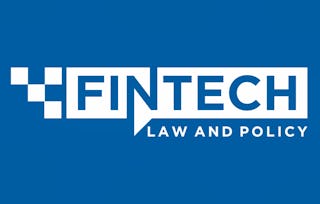This course explores the developments that have fueled the emergence of fintech companies around the world. Following the changing regulatory environment, especially since the 1997 Asian and 2008 global financial crisis, governments have enacted far-reaching new financial regulations for safeguarding financial stability. However, banks and financial institutions have found it increasingly difficult to be profitable in these new regulatory environments. Technology is taking leaps forward in artificial intelligence and blockchain and this has created new opportunities for fintech entrepreneurs.

Financial Regulation in Emerging Markets and the Rise of Fintech Companies

Financial Regulation in Emerging Markets and the Rise of Fintech Companies
This course is part of Fintech Startups in Emerging Markets Specialization

Instructor: Co-Pierre Georg
13,223 already enrolled
Included with
171 reviews
What you'll learn
How changes in the global financial regulatory environment have come to drive fintech innovations.
How technology, such as artificial intelligence and blockchain, make possible the rise of fintech companies.
Skills you'll gain
- Consumer Lending
- Blockchain
- Financial Regulations
- Financial Services
- Payment Processing
- Payment Systems
- Financial Systems
- Regulatory Compliance
- Regulatory Requirements
- Lending and Underwriting
- Banking
- Financial Regulation
- FinTech
- Loans
- Risk Modeling
- Mobile Banking
- Financial Market
- Emerging Technologies
- International Finance
- Skills section collapsed. Showing 9 of 19 skills.
Details to know

Add to your LinkedIn profile
See how employees at top companies are mastering in-demand skills

Build your subject-matter expertise
- Learn new concepts from industry experts
- Gain a foundational understanding of a subject or tool
- Develop job-relevant skills with hands-on projects
- Earn a shareable career certificate

There are 4 modules in this course
So you’re interested in the opportunities for fintech? I’ll be taking you back to the key events in the financial crises of the late 1990s and early 2000s in order to understand the growth of fintech in emerging markets. We’ll be looking at the basic mechanisms behind banking and what happened when the financial markets crashed. It’s essential for us to become familiar with the new financial regulations and how they create opportunities and constraints for fintech today. Over the four weeks of the course, you will be invited to think about how new financial regulations have spurred the rise of fintech companies in emerging economies.
What's included
12 videos4 readings3 assignments1 discussion prompt
We dive into details of financial systems this week - looking at how banks function and are regulated. Using the Great Depression as a starting point, I describe what caused the collapse of banks a century ago, to reflect on the impact of the post-depression financial regulations that followed. These regulations included the establishment of international financial institutions that controlled current monetary policies. Being familiar with the current financial regulatory framework and where it comes from provides the basis for understanding the disruptions from the fintech innovations we will be covering next week.
What's included
12 videos3 readings4 assignments1 peer review
We've now reached the heart of the course - looking at the context of fintech in emerging economies and what makes them different. To begin we will look at Initial Coin Offerings (ICO) which are one of the key mechanisms used fintech companies to finance themselves. We are going to focus particularly on South Africa, China, and Brazil, and I have a number of interviews with people involved in banking, financial regulation and fintech from these countries.
What's included
12 videos3 readings3 assignments
In this last week of the course, we look at applications of fintech in emerging economies. I have selected two widely adopted applications to explore: peer-to-peer lending and remittances. Because of the costs of banking and the exclusion of millions from formal banking systems, entrepreneurs have been exploring innovative mechanisms to finance business by borrowing from peers. Fintech offers a fast and secure mechanism to transfer remittances that are being widely used across the world - and we will look at some examples. I also asked people from the banking sector to describe how large formal financial institutions are considering the impact of blockchain and other new technologies. At the end of this week, you will have a chance to apply what you’ve learnt in a final assignment.
What's included
13 videos2 readings2 assignments1 peer review
Earn a career certificate
Add this credential to your LinkedIn profile, resume, or CV. Share it on social media and in your performance review.
Instructor

Offered by
Explore more from Finance
 Status: Free Trial
Status: Free TrialUniversity of Cape Town
 Status: Preview
Status: PreviewDuke University
 Status: Free Trial
Status: Free TrialThe Hong Kong University of Science and Technology
 Status: Free Trial
Status: Free TrialUniversity of Pennsylvania
Why people choose Coursera for their career

Felipe M.

Jennifer J.

Larry W.

Chaitanya A.
Learner reviews
- 5 stars
72.51%
- 4 stars
22.22%
- 3 stars
2.92%
- 2 stars
1.75%
- 1 star
0.58%
Showing 3 of 171
Reviewed on Jan 24, 2022
This is an excellent Course where all ideas are well elaborated and all topics are very fruitful. I congratulate the Instructor for this great job.
Reviewed on Sep 11, 2024
Great and insightful course that should serve as the starting point for anyone considering embarking on a fin tech journey
Reviewed on Aug 17, 2022
I am now at ease to discuss on the importance of Fintech in Emerging economies.

Open new doors with Coursera Plus
Unlimited access to 10,000+ world-class courses, hands-on projects, and job-ready certificate programs - all included in your subscription
Advance your career with an online degree
Earn a degree from world-class universities - 100% online
Join over 3,400 global companies that choose Coursera for Business
Upskill your employees to excel in the digital economy
Frequently asked questions
To access the course materials, assignments and to earn a Certificate, you will need to purchase the Certificate experience when you enroll in a course. You can try a Free Trial instead, or apply for Financial Aid. The course may offer 'Full Course, No Certificate' instead. This option lets you see all course materials, submit required assessments, and get a final grade. This also means that you will not be able to purchase a Certificate experience.
When you enroll in the course, you get access to all of the courses in the Specialization, and you earn a certificate when you complete the work. Your electronic Certificate will be added to your Accomplishments page - from there, you can print your Certificate or add it to your LinkedIn profile.
Yes. In select learning programs, you can apply for financial aid or a scholarship if you can’t afford the enrollment fee. If fin aid or scholarship is available for your learning program selection, you’ll find a link to apply on the description page.
More questions
Financial aid available,
¹ Some assignments in this course are AI-graded. For these assignments, your data will be used in accordance with Coursera's Privacy Notice.

